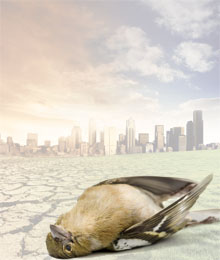Animal Deaths, Natural Disasters and Climate Change
February 10, 2011 by Michael Hill
Filed under lifestyle
 I’m bemused by North American’s attitude when it comes to the environment. All this selfish, narrow-minded and ignorant garbage about new cars, big screen TVs and steak on the barbeque is deplorable. When are we going to wake up, take responsibility and recognize the problems we cause?
I’m bemused by North American’s attitude when it comes to the environment. All this selfish, narrow-minded and ignorant garbage about new cars, big screen TVs and steak on the barbeque is deplorable. When are we going to wake up, take responsibility and recognize the problems we cause?
This past year, the Earth was rocked by a wave of natural disasters that were greatly intensified by climate change. These included mass heat waves across the globe, droughts in Russia and flooding in Pakistan, China and Australia – the list goes on. There were 950 natural disasters recorded, well over the decade’s average of 785, and the second-worst year since 1980. Of course, disasters like earthquakes and tsunamis are out of our hands, but with our planet’s rising temperature, other disasters are being amplified and wildlife is at risk. Who cares, right?
“There’s going to be natural fluctuations and natural disasters whether the climate is warming or not. But what’s happening is the extremes are nudging upwards,” explains Danny Harvey, a professor of geography and energy policy expert at the University of Toronto. “If you look at what’s happening to the success of lows, they are edging up. And if you look at the highs, they’re starting to edge up over time.”
Harvey first heard the phrase “global warming” back in 1978. Yep, that’s right, over 30 years ago warnings were vocalized about the consequences of our rampant and carefree habits. Yet, here we are, coming off a blisteringly hot year where temperature records were shattered across the globe – including here in Canada where, according to Environment Canada, our national average temperature was three degrees above normal, making 2010 “the warmest year on record since nationwide records began in 1948.” Furthermore, out of the 10 warmest years on record, four have occurred within the last decade. But who cares, right?
You can dispute the figures all you want, but let’s be real, the way we conspicuously and uncontrollably consume energy is absolutely, indisputably irresponsible. How can we expect our unchecked and unrelenting devouring of resources and our continuous spewing of emissions to be a benefit to the planet? There is a dangerous, short-sighted and far-too-common paradigm in Canada that believes that because we are blessed with the privileges of democracy we have the “freedom” to do whatever we want. It’s this ignorance that will be our, and consequentially, the environment’s, undoing.
Actually, with the massive amounts of animal deaths in the news, the environment has been a recent hot topic. The thousands of dead birds in Arkansas; the millions of dead fish washing up on the shores of Maryland’s Chesapeake Bay, as well as Brazil and New Zealand; and thousands of crabs littering the shores of Thanet Coast in the U.K. – these global fatalities have caused concern for the delicate balance that is the world’s eco-systems.
“While these very dramatic events are alarming, and they definitely draw the attention of the media and the public, the reality is that the unraveling of eco-systems and food webs is happening every single day all around us,” says Dr. Faisal Moola, head of the terrestrial team at the David Suzuki Foundation.
Although there is still speculation to the specifics of the above-mentioned animal deaths, they are still examples of the fragility of eco-systems. In fact, if we continue to dump emissions at the current pace, 20 – 30 per cent of all animal and plant life will go extinct prematurely, and this could happen within the next few decades.
“While these very acute occurrences do happen, and sometimes they’re actually happening because of natural reasons, the reality is that there is a widespread endangerment of plants and animals and that’s happening as a direct consequence of human activity, and that includes things like climate change,” says Dr. Moola.
It might be difficult to think about the future with today’s tough economic climate, but such a position creates a missed opportunity. “It’s in our own economic interest to actually take action on climate change,” continues Dr. Moola. “If we don’t invest, for example, in renewable and energy efficient technology and make Canada a net exporter of renewable energy, we are going to lose out on the global competition to become the new energy leader.”
Let’s not place the blame squarely on the public. We’ve been raised with consumerism as an ideology for decades. Everywhere you look, there are commercials and ads telling you that buying the newest product is not only a good thing, but the right thing – but we forget constant entropy is created, and needed, to keep consumerism and industry alive. And I mean, you still need to buy that 50” TV, right?
Our government, both federal and provincial, is not making things easier either. By not providing the proper infrastructure and services to allow individuals to make conscious decisions, our current government hinders any progress that could be made. Combine that with our unwavering resistance to change and our obsession with comfort and entertainment, and I see little reason to be optimistic that things will improve.
The problem is, as a nation, we simply don’t care. We cringe at the word “sacrifice,” but that’s what responsibility entails. That includes not driving gas-guzzling SUVs, limiting urban sprawls, improving the energy efficiency of buildings, and higher taxes on gas to act as a disincentive for wasteful fuel consumption. But, in the end, it’s not your future; it’s only your children’s. So who cares, right?
For those who care, read more of humanity’s harmful impact at www.davidsuzuki.org







“The thousands of dead birds in Arkansas”
It’s funny how the dead birds were found at the foot of wind turbines. I’m sure it means nothing.